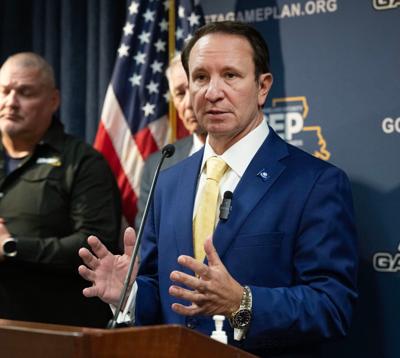In his “Confessions,” St. Augustine laments his past penchant for sin, which he calls “the tyranny of habit.” In one of his most oft-quoted passages, he writes, “Habits, if not resisted, soon become necessity.”
That passage comes to mind when considering how best to reform Louisiana’s overly complex tax system. Our tax code is riddled with longstanding exemptions that have become necessity — immutable sacred cows — which have, in turn, imposed a form of fiscal tyranny on governors, lawmakers and taxpayers.
As the Legislature gathers Wednesday for called by Gov. Jeff Landry, many of those sacred cows will be on the chopping block. Landry proposes of Louisiana’s tax system that he says will, if approved by lawmakers this month and voters next March, effectively end the tyranny of Louisiana’s old fiscal habits.
This is very complicated stuff, but to start uncomplicating it.
Here's the big picture: Landry wants lawmakers to lower personal and corporate income taxes, eliminate the corporate franchise tax and make the temporary 0.45% sales tax permanent — all by Nov. 25. To offset those tax cuts, at least in part, Landry wants lawmakers to abolish tax credits and exemptions that currently cost the state some $300 million. Ending those exemptions would mean taxing several dozen services and digital items that currently are not taxed.
In March, Landry wants voters to approve a sweeping constitutional amendment that would, among many other things, combine the state’s two “stabilization funds” into a much larger (and still constitutionally protected) fund. The amendment also would make it harder for lawmakers to grant future tax breaks.
Team Landry says the plan is close to revenue neutral in the current fiscal year and would produce more revenue — and a lot more fiscal flexibility — in future years.
Critics say it would a leave gaping revenue shortfall within two years.
Oddly enough, both are correct. The difference is context.
Both start with by the Legislative Fiscal Office, which looks at the total state fisc — without explanatory notes and context.
Here's the context: The LFO analysis shows total state revenues declining by $329 million in the current fiscal year ending June 30. That figure includes $205 million in corporate taxes that currently go into a dedicated fund for future infrastructure projects, not into the “general fund” for recurring state spending in the annual operating budget.
That $205 million figure grows in future years, according to the LFO, but none of it affects the annual state budget. But it does lead to the scary $742 million shortfall figure that critics of Landry's plan often cite.
Team Landry says the actual impact on the current fiscal year’s operating budget would be only $124 million — and future years would see a growth in general fund revenues.
As regards this fiscal year's potential shortfall, tax collections in recent years have consistently been stronger than initial, conservative projections by the state Revenue Estimating Conference. The REC adjusts its projections several times a year as revenues come in, and for several years Louisiana has seen large surpluses.
Because the LFO analysis of Landry’s plan is based on current, conservative REC projections, adjusted REC projections (including Super Bowl and Taylor Swift sales tax collections) could wipe out much if not all of the LFO's projected shortfall if the state realizes another surplus.
Even without an REC adjustment in the next six months, Landry and lawmakers have options that won’t involve draconian cuts.
But what about the constitutionally dedicated funds for future infrastructure projects and other immediate needs?
Critics say undedicating any funds would jeopardize important needs. That’s true. It’s also true that Landry’s proposed amendment would free up some currently dedicated funds, thereby allowing lawmakers to prioritize needs during tough times instead of automatically forcing higher education and health care to bear the brunt of budget cuts.
And, if voters approve the proposed constitutional amendment, Team Landry promises the state would have many more millions each year to spend on nonrecurring items — especially infrastructure.
Time will tell who's right.
Change is scary. Tax exemptions and other tax breaks don’t happen by accident. Lawmakers and governors grant them at the request of powerful special interests, in the cause of political self-preservation, or both.
Landry is asking a lot of lawmakers, who will be inundated with warnings, promises and predictions if they dare to defy the tyranny of Louisiana’s old fiscal habits.

